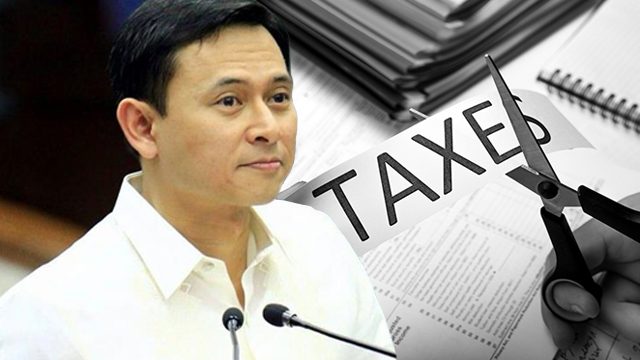SUMMARY
This is AI generated summarization, which may have errors. For context, always refer to the full article.

MANILA, Philippines – Senator Juan Edgardo “Sonny” Angara has filed a bill that seeks to adjust the levels of taxable income to inflation.
In a statement on Friday, November 6, Angara said while the initial proposal was to lower the tax rates across-the-board and compress the tax brackets from 7 to 5, adjusting income taxes to take into account inflation is a more viable proposal for the remaining time of the present administration.
“This is the minimum position our government can take in reforming our outdated and unjust tax system,” said Angara, chairman of the Senate ways and means committee. (READ: Angara: High taxes may drive Filipino workers to ASEAN neighbors)
“I am still pushing for tax reform despite the clock ticking and election season fast approaching. This is not merely an economic issue or a political move. Income tax reform is an issue of social justice, fairness, and equity,” he added.
Taxable income refers to an individual’s gross income less the deductions and/or personal and additional exemptions. Inflation is the rate at which prices of goods and services rise.
Headline inflation rate has been hitting below 1% since June this year, with the October rate headlined at 0.4%, the same as September rate. (READ: Inflation steady at 0.4% in October)
Under the National Internal Revenue Code of 1997, individuals with a taxable income of over P500,000 ($10,656.46) are taxed with a fixed amount of P125,000 ($2,664.11) plus 32% of the excess over P500,000.
Among member-countries of the Association of Southeast Asian Nations, the Philippines has the second highest individual income tax rate at 32%, next to Thailand’s and Vietnam’s 35%. (READ: Why PH has 2nd highest income tax in ASEAN)
Taxation shall be uniform, equitable
In his explanatory note to his new income tax reform bill, Angara emphasized that the Constitution mandates that the “rule of taxation shall be uniform and equitable,” and that “Congress shall evolve a progressive system of taxation” wherein the tax rates imposed must be based on the person’s ability to pay.
“P500,000 ($10,656.46) in 1997 does not have the same value today due to inflation. P1 ($0.021) in 1997 when adjusted for inflation is now worth only 44 centavos,” Angara said.
He added that middle-income earners, who were mostly taxed at 25%in 1997, are now pushed into the top tax bracket at 32% together with the country’s billionaires because of the outdated tax system.
“Is this equitable and progressive? Clearly, it is not,” the senator said.
Thus, under Senate Bill No. 3003, the 7 tax brackets will be retained but with the following adjustments:
- Bracket 1: Those earning not over P23,000 ($490.29) would pay a fixed tax rate of 5%
- Bracket 2: Those earning over P23,000 ($490.29) to P68,000 ($1,449.45) would pay a fixed tax of P1,100 ($23.45), plus 10% of the excess over P23,000 ($490.29)
- Bracket 3: Those earning over P68,000 ($1,449.45) to P160,000 ($3,410.43) would pay a fixed tax of P5,600 ($119.37), plus 15% of the excess over P68,000 ($1,449.45)
- Bracket 4: Those earning over P160,000 ($3,410.43) to P320,000 ($6,823.68) would pay an excess tax of P19,400 ($413.67), plus 20% of the excess over P160,000 ($3,410.43)
- Bracket 5: Those earning over P320,000 ($6,823.68) to P570,000 ($12,154.69) would pay a fixed tax of P51,400 ($1,096.06), plus 25% of the excess over P320,000 ($6,823.68)
- Bracket 6: Those earning over P570,000 ($12,154.69) to P1.2 million ($25,580.96) would pay a fixed tax of P114,000 ($2,430.19), plus 30% of the excess over P570,000 ($12,154.69)
- Bracket 7: Those earning over P1.2 million ($25,580.96) would pay a fixed tax of P300,000 ($6,395.23), plus 32% of the excess over P1.2 million ($25,580.96)
“In effect, we are reducing the tax burden of our workers as most of them will be pulled back to their original tax brackets in 1997. Tinatama lang po natin ang sistema. (We’re just correcting the system),” Angara said.
The proposed measure also provides for an automatic adjustment in the tax schedule every 3 years using the consumer price index “so that inflation will not result in tax increases.”
Tax woes
Angara said President Benigno Aquino III and his economic managers have thumbed down proposals to lower income tax rates given the possible revenue loss of up to P30 billion ($639.33 million).
The Aquino administration is instead pushing for the passage of the Salary Standardization Law (SSL) IV that would increase the salaries of 1.3 million government employees but would cost the government more than P50 billion ($1.07 billion).
“If we leave our brackets without provisions for indexation or automatic adjustment, our workers, despite an increase in their salaries, will make less money in real terms than in 1997 because of inflation and as a result of being in a higher tax bracket,” Angara said.
He added that due to underspending, the government has more than enough fiscal space to implement both the SSL IV and the income tax reform.
Any revenue loss could be recovered, particularly through the value added tax (VAT) on goods because of the additional spending of the people brought by higher take-home pay. – Rappler.com
$1 = P46.92
Angara image from the senator’s Facebook page; tax cut image from Shutterstock
Add a comment
How does this make you feel?
There are no comments yet. Add your comment to start the conversation.